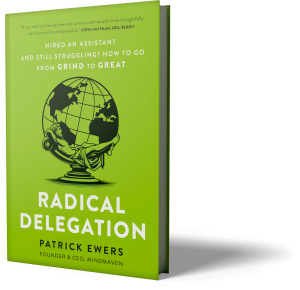Do You Have a Growth Mindset?
I just finished reading the book called Switch, by Dan and Chip Heath. It’s one of the best books I have ever seen on change and habits. If you are trying to adopt new habits or change the habits of your organization this book is an absolute must read. But how does it relate to referral generation and NRM? In many ways! So let me start with this one:
Fixed Mindset vs. Growth Mindset
How would you respond to these statements?
- You are a certain kind of person, and there is not much that can be done to really change that.
- No matter what kind of person you are you can always change substantially.
- You can do things differently, but the important parts of who you are can’t really be changed
- You can always change the basic things about the kind of person you are
If you believe in 1 or 3 you are most likely to be of a “Fixed Mindset,” if you tend to agree with 2 and 4 you are prone to have a “Growth mindset”
What’s is it like having a Fixed Mindset?
- You find yourself thinking that your abilities are what they are, pretty much static.
- The fixed mindset makes you believe that you can improve a little here and there but also weaken a few skills at times, but mostly abilities reflect the way you’re wired.
- Avoiding challenges is not foreign to you, due to the fact that if you fail, you worry that your network will see this as an clear sign of your real skills and see you as a lost cause.
What’s it like to have a Growth Mindset?
- You fundamentally feel that your abilities are similar to muscles – they get stronger with practice.
- You tend to take on more challenges, almost seek them out, despite the risk of failure
- It is easier for you to hear criticism, since you believe that in the long run it makes you better
Sound familiar? Found yourself? So who comes up with that? Tony Robbins?
The Answer is no! This is pure science, brought to you by Stanford’s Carol Dweck (Professor of psychology)
Her research clearly suggests:
- To get to your full potential, a growth mindset is required.
- If you belong to the group of people who take on stretch goals, dare to accept risks, crave feedback, and always aim for the long-term perspective — you will simply not be able to help but improve and further you life and career.
- A growth mindset focuses on effort instead of pure pre-existing skill: “I really liked that you put a lot of energy into this task !“
- Most importantly Dweck proved that the growth mindset is something that can be learned and because of that, can change any lives.
So how does that help me get more referrals, more opportunities from my network?
In my view, growth mindset is highly correlated with an open, welcoming mind. An open mind is what is needed to connect with people, having such a connection is one critical component of what builds mindshare, which in turn is fundamental for generating referrals. This new open mind of yours, can’t help but change your body language into an welcoming open posture. It drives your natural curiosity through the roof, resulting in you asking more questions with genuine interest. When you ask questions, you are driven to listen. When you listening, you will make people feel heard. We know only few things feel better than being heard. And that drives the mindshare, or being “top of mind” dramatically.
Moreover, we learned that it is possible to control your mind and change your mind to be growth focused. That is a very important relevation, because most functions that make us behave in a way to let us connect with other people in a relevant and meaningful way is simply out of our control. For example, Dacher Keltner at UC Berkley has proven that almost no one can fake a genuine smile. The only way we can get to this is to have our mind be in a state that simply makes us smile genuinely, have a higher state of curiosity and a more open body language.
If we put one and one together we realize that we do have a path to control all those important aspects, only that it is indirect by bringing our mind into the right state. And this, I believe, is the most important skill you can learn if you are depending on relationships for your professional success, personal well-being and simple happiness. So let me ask you: Are relationships important to you? If you are nodding, then start working on your growth mindset today.
In many ways the Silicon Valley is a huge pool of “Growth Mindset”. Coming from a culture where the fixed mindset is ever-present I learned to truly value this aspect of living in the Bay Area. It is one of the reasons I would give to people that ask me: “Why do you live here?”

